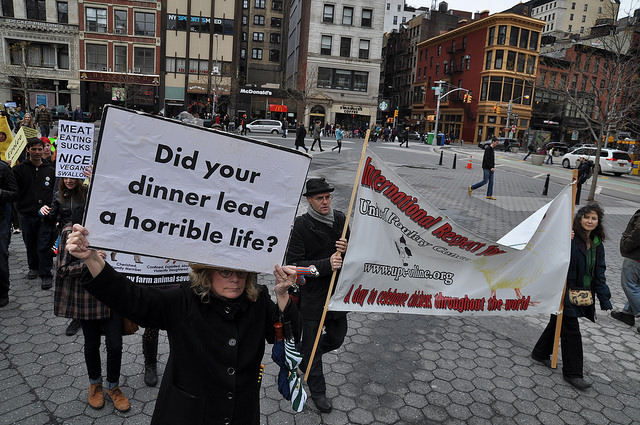
The devastation of Hurricane Florence is not limited to the loss of human lives. It is estimated that millions of chickens and thousands of pigs died in North Carolina from the flooding. Vegan social movements have pointed to this major loss of animal life as one of the many reasons to reduce our reliance on meat and the consumption of other animal products. However, these groups face a difficult path ahead as factory farming is a massive U.S. industry. A recent article in The Atlantic highlights research by sociologists Corey Wrenn, Nina Gheihman, and Elizabeth Cherry on the many obstacles that can thwart veganism from blossoming into a large-scale social movement.
According to Wrenn, one of the main barriers to mobilization of any social movement is that they allow “free-riders”, or individuals who may identify with the movement but do not change their behavior. In the case of veganism, including “flexitarians” — people who are interested in vegetarianism or veganism but still eat meat and other animal products — waters down the cause’s overall message. Wrenn argues that including flexitarians “maintain[s] the illusion of mass support, [while] real power is reserved for core members.” Wrenn suggests that smoking cessation campaigns provide a key example of how an “all or nothing” approach can bring about meaningful change in consumption behaviors.
In the same article, Elizabeth Cherry and Nina Gheihman push back against Wrenn’s claims, advocating that incrementalism and inclusion of those who aren’t strictly vegan may lead to more success for vegan social movements. Cherry, who has a book comparing animal rights activism in France and the United States, argues that vegan social movements promoting meat reduction rather than complete elimination parallels the often incremental shift by many vegans into a plant-based diet. Gheihman agrees with Wrenn that flexitarianism may damage vegan social movements in the long-term, but also believes that including those at the margins of the movement accounts for the multiple motivations people may have for going vegan. Gheihman expands further,
“I do believe that flexitarianism as an initial approach is worthwhile, as there are many people who are not willing to adopt the ideological stance of the animal-rights movement within a society that does not yet embrace it. As well, they may have alternate motivations for following a plant-based diet, including health and environmentalism, and I believe these motivations are as valid as that of animal rights.”

Comments 1
Colleen — September 27, 2018
I see both sides of the issue and it is a tough debate. If a flexitarian or reducitarian or lacto-ovo vegetarian or vegetarian is en route to a 100% plant-based diet (veganism encompassing all aspects of life beyond food - clothing, shoes, cosmetics, household, etc) that is favourable for moving the world towards non-consumption of animals for any purpose. If one is just reducing animal consumption and that's as far as it goes, then I think that while it does prevent some animal deaths, it doesn't have an end plan and is lip service to the cause. There should be an end game. The reason to reduce and hopefully eliminate animal products serves health, compassion and environmentalism. There is no better way to achieve any or all of these personal and global objectives. So for that reason, I do feel like vegans have the education and understanding to lead activism. I also feel that anyone who eats animals doesn't really understand any animal advocacy or environmental cause that they may campaign for and is therefore hypocritical or ignorant. I am challenged, though, to suggest this to friends and others who, for example, post their support to the Humane Society for rescuing dogs from Asia while living on a beef cattle ranch (true story) so therein lies the dilemma! #communityvegan